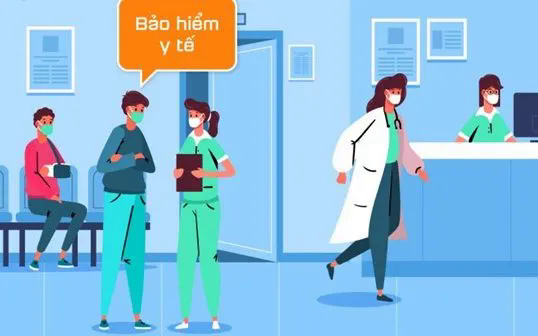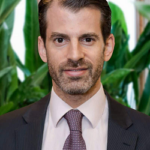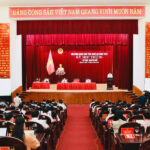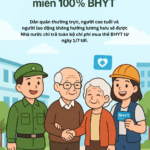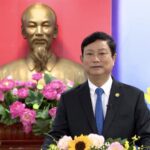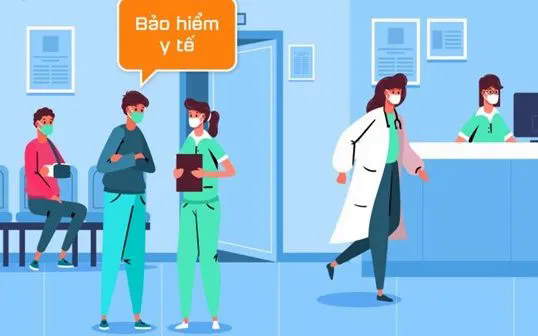
Illustration: Ho Chi Minh City Department of Health
These changes not only expand benefits but also demonstrate a commitment to achieving equitable healthcare and practical, sustainable universal healthcare. Specifically:
Home and remote medical examinations and treatments are now covered by health insurance for the first time, including medication, medical supplies, and reasonable transportation costs in cases of emergency transfer or hospitalization. This is a very humane step forward, especially for the elderly, chronically ill, disabled, or those living in remote areas.
After five consecutive years of participation, health insurance will cover 100% of co-payments if they exceed six times the reference amount (VND 14.04 million) within a year. This policy expresses gratitude towards long-term participants and encourages continuous and responsible maintenance of health insurance.
Patients with critical or rare illnesses no longer need administrative referrals. Starting July 1, 2025, their health insurance will cover all expenses for treatment at specialized facilities. This reduces red tape, shortens waiting times, improves treatment effectiveness, and ensures maximum benefits for patients facing the most challenging circumstances.
Removal of administrative boundaries for health insurance medical registration: Previously, many long-term temporary residents had to return to their initial health insurance registration locations for proper medical treatment, causing inconvenience and additional expenses. As of July 1, 2025, those who have declared temporary residence for 30 days or more in a new location will be eligible for proper medical treatment without returning to their initial registration location. This new regulation aligns with today’s labor migration, study, and work patterns and significantly facilitates timely access to healthcare services and the realization of legitimate rights.
Enhanced support for vulnerable groups: Specifically, from July 1, 2025, several vulnerable groups in society will receive health insurance support, including village health workers, non-specialized staff in villages and residential areas, folk artists, and victims of human trafficking. In addition, many groups will receive health insurance cards entirely free of charge, such as full-time militia, people aged 70 to 75 from near-poor households receiving monthly survivor benefits, social pension recipients, and workers who have passed retirement age but do not yet qualify for a pension…
This is clear evidence of a humane policy that covers and protects vulnerable groups, providing equal access to healthcare for all citizens.
Family health insurance with reduced costs based on family size: In addition to expanded benefits, the family health insurance policy has also become more flexible. Accordingly, the premium for each additional family member will decrease: the second person pays 70% of the first person’s premium, the third person pays 60%, the fourth person pays 50%, and from the fifth person onwards, only 40%. This helps reduce financial burdens, especially in rural and large families.
Simplified procedures with automatic data connection: With proper temporary and permanent residence declarations, a citizen identification number, and compliance with regulations, individuals can quickly establish their place of residence, obtain an electronic health insurance card, and reduce their waiting time to 30 days. This marks a significant advancement in administrative procedure reform.
The health insurance policy, which takes effect on July 1, 2025, is groundbreaking in terms of scope, subjects, benefits, and support mechanisms. People can now access new services such as home medical examinations, treatment for critical illnesses at specialized hospitals without referrals, transportation cost support, BHYT drug reimbursement when hospitals lack medication, reduced family premiums, and, especially, 100% coverage after five consecutive years of participation. All of these changes demonstrate that health insurance is not just a financial tool but also a sustainable safety net that accompanies citizens in their healthcare journey.
According to the Ho Chi Minh City Department of Health, implementing the new health insurance policies effective July 1, 2025, brings many practical benefits but also poses challenges requiring thorough and synchronized preparation. First, the information technology system needs a comprehensive upgrade to ensure interoperability with the civil database, assign identification codes, and facilitate safe and accurate electronic payments. Additionally, healthcare facilities, particularly at the grassroots level, need to enhance their professional capabilities and supplement their staff appropriately to effectively provide medical examination and treatment services at specialized technical levels, especially given the potential increase in the number of medical examinations due to the elimination of administrative boundaries – entirely novel aspects of this policy. Simultaneously, communication efforts must be intensified to ensure they are comprehensive, easy to understand, and prevent situations where citizens misunderstand or miss out on benefits due to a lack of accurate and sufficient information. These are the key factors determining the successful implementation of the policy in practice.
“International Healthcare Standards in Vietnam: Elevating the Japan-Vietnam Partnership.”
“A groundbreaking partnership has been forged between a leading Vietnamese enterprise and a prominent Japanese healthcare corporation listed on Nasdaq. This collaboration aims to bring cutting-edge medical solutions closer to the Vietnamese community, revolutionizing healthcare access and enhancing the well-being of the people.”
Indictment: Chairman of Son Lam Pharmaceutical Company Charged with Bribery Scandal Involving Over $70 Million
“In a recent scandal, the Chairman of the Board of Directors of Son Lam Pharmaceutical Joint Stock Company, Pham Van Cach, has been accused of bribing officials with over VND 70 billion ($3 million). This allegedly occurred during the execution of a contract to supply medicines to several hospitals and healthcare centers. The bribe was purportedly used to ensure smooth operations and avoid any obstacles or difficulties in the contract’s execution.”
“Founder of Mekong Capital Joins the Board of Directors of TNH Hospital Group”
At the recent 2025 Annual General Meeting, the shareholders of TNH Hospital Group Joint Stock Company (HOSE: TNH) elected Mr. Christopher E. Freund, the esteemed founder of Mekong Capital, to their Board of Directors for the term 2025-2030.

